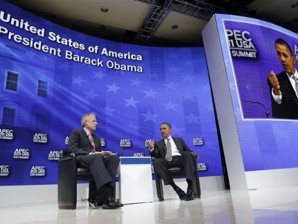Obama sees economic power of Asia-Pacific region
HONOLULU —Placing high hopes on the economic power of Pacific rim nations, President Barack Obama on Saturday declared the Asia-Pacific region the heart of explosive growth for years to come. For businesses, he said, “this is where the action’s going to be.”

HIGH HOPES FOR ASIA-PACIFIC REGION. President Barack Obama answers questions from Boeing Chief Executive Officer Jim McNerney as he attends the APEC CEO Summit in Honolulu, Hawaii, Saturday, Nov. 12, 2011. Courting help from Asian powers, President Barack Obama on Saturday sought to improve the beleaguered American jobs outlook with an eye toward next year's election and contain deepening nuclear worries over Iran on a day of heavy diplomacy. AP Photo/Charles Dharapak
Obama was in Hawaii courting Asian powers as he sought to improve the beleaguered American jobs outlook. His move comes as his administration has poured attention and capital into deepening relations with Asia as a source of trade, jobs and security ties.
“There is no region in the world that we consider more vital than the Asia-Pacific region,” he told chief executives gathered for a regional economic summit.
For the U.S., Obama’s outreach also reflects worries about Europe’s economic troubles and the need for the United States to tap the enormous base of potential consumers in the emerging nations of Asia.
Underscoring the region’s importance to the U.S., Obama on Saturday, as expected, announced the broad outlines of an agreement to create a trans-Pacific trade zone encompassing the United States and eight other nations. He said details must still be worked out, but added: ‘I’m confident we can get this done.”
On a day of heavy diplomacy, the president also was looking to contain deepening worries over Iran amid a fresh U.N. atomic agency report that Iran is working secretly on a nuclear weapon.
On the sidelines of an Asia-Pacific economic summit, Obama was to meet with Chinese President Hu Jintao, Russian President Dmitry Medvedev and Japanese Prime Minister Yoshihiko Noda. The timing of the meetings with the Russian and Chinese leaders was particularly significant as Obama seeks to increase world pressure on Iran.
Obama is the host of the APEC gathering, a non-binding forum that draws 21 nations from across a vast Asia-Pacific region. Obama chose to host the event in his home state of Hawaii to illustrate his ties and economic commitment to the Pacific region, although security threats may well dominate his private meetings.
“The United States is a Pacific power and we’re here to stay,” Obama said.
He called the trans-Pacific trade zone agreement a model for the Asia-Pacific region and for other trade pacts. Seated with the leaders of the eight other nations, Obama said the trade zone would increase U.S. exports and help create jobs, a top priority.
He said the U.S. is committed to shaping the future security and prosperity of what he called the “fastest growing region in the world.”
The eight countries joining the U.S. in the zone would be Australia, Brunei, Chile, Malaysia, New Zealand, Peru, Singapore and Vietnam. A central topic for Obama and Noda will be Japan’s interest in joining the trade bloc.
That pact and its potential payoff for U.S. jobs and business will allow Obama to cast his far-flung travels as crucial to American voters with an election year approaching and concerns of domestic voters centered on the dragging economy. Obama also met with U.S. business leaders Saturday to highlight the importance for interests back home of the Asia-Pacific region.
Addressing the European debt crisis, Obama said he welcomed the new governments being formed in Greece and Italy, saying they should help calm world financial markets. He said leaders in both countries are demonstrating a commitment to “structural reform” that should give investors confidence. Obama said all of Europe should back the 17 eurozone members in their efforts to resolve their debt crisis — and warned until that’s resolved, they’ll will have a “dampening effect” on the global economy.
Ahead of Obama’s arrival on Friday, Secretary of State Hillary Rodham Clinton said at the Pacific Rim summit that Iran has a history of deception over its nuclear intentions and must respond to the International Atomic Energy Agency report “in the coming days.” Iran dismisses the allegation about its nuclear program and says its activities are meant to be used only for energy or research.
With Hu and Medvedev, Obama encounters two leaders with whom he’s sought close relations despite fraught histories between the U.S. and those countries, with disagreements on human rights, territorial disputes, economics and other issues. For the president, the challenge is to maintain those ties while also pushing U.S. priorities.
It will be Obama’s first meetings with those leaders since release of a report by the atomic agency saying for the first time that Iran is suspected of conducting secret experiments whose sole purpose is the development of nuclear arms.
For the U.S., the report offered significant support for some long-held suspicions and lent international credence to claims that Tehran isn’t solely interested in developing atomic energy for peaceful purposes.
U.S. officials have said the IAEA report is unlikely to persuade reluctant powers such as China and Russia to support tougher sanctions on the Iranian government. But Obama’s talks with Hu and Medvedev on that issue and others, including the North Korea nuclear threat, and China’s currency, which the U.S. believes China manipulates to the detriment of U.S. interests, were sure to be closely watched.
Obama will be in Honolulu through Tuesday, when he leaves for Australia before ending his trip in Indonesia, the country where he spent several years as a boy. He will attend a security summit of Asian nations.
Associated Press Writer Erica Werner contributed to this report.














